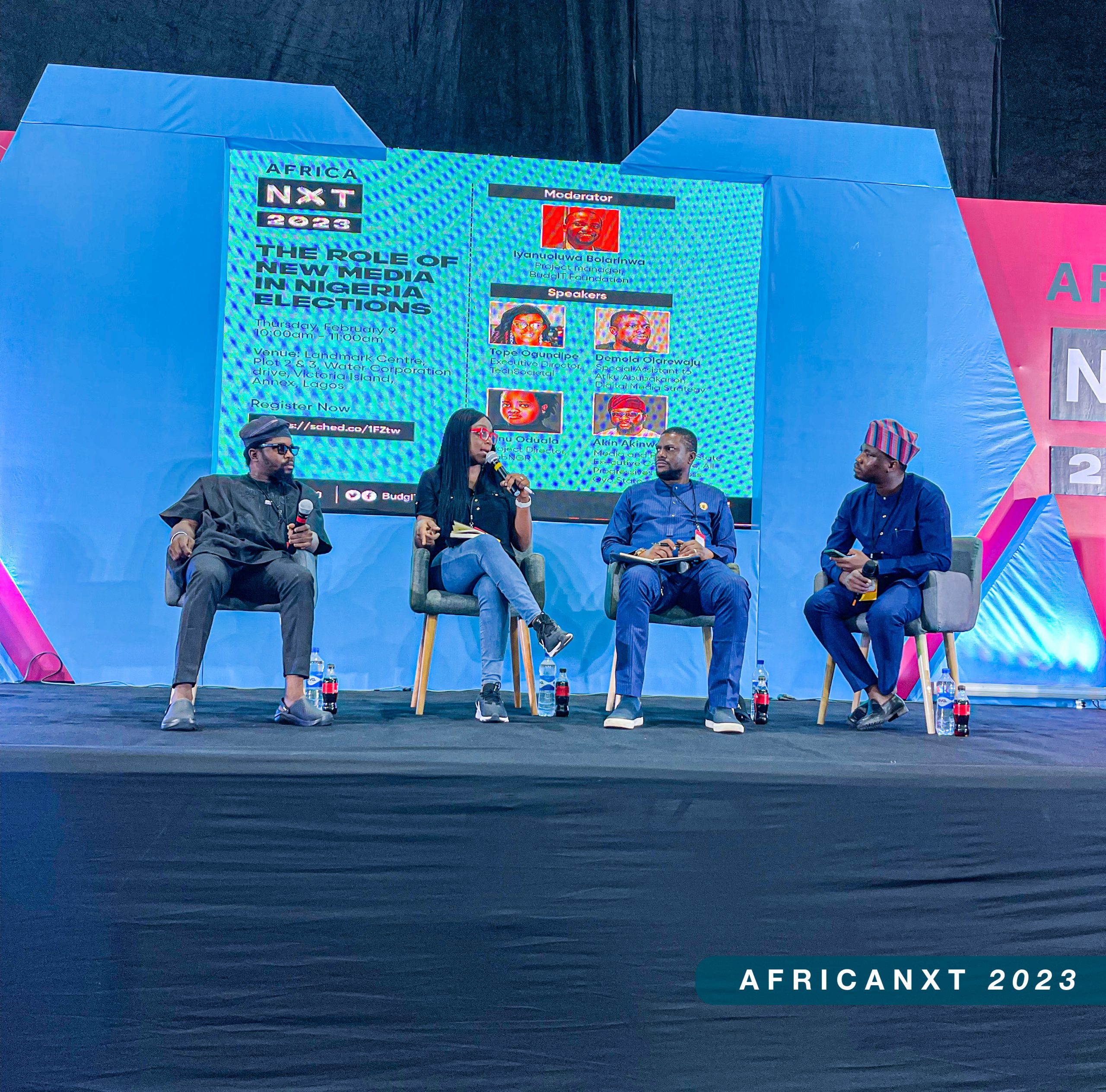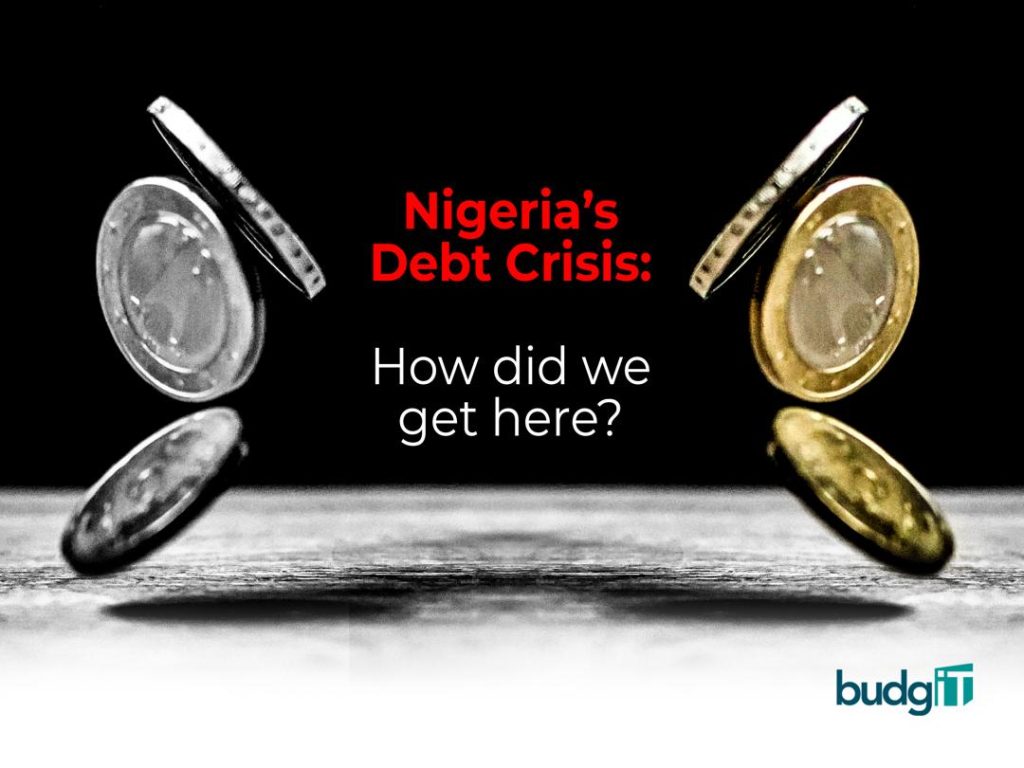‘The new media has become a space that is easily accessible and cannot be controlled by the government which has become a symbol of hope and change.’ – Rinu Oduala
New media has become a defining element in many countries, including Nigeria, where it is profoundly integrated into critical concerns such as policy formation, government, the economy, and even electioneering. While social media has played an increasingly important role in Nigeria’s electoral process since 2011, the big question is how much of a role it will play in the country’s 2023 elections.
On this basis above, BudgIT hosted a discussion at the 2023 AFRICANXT session about the positive and negative effects of social media on elections and how they might be effectively exploited to guarantee a free and fair political process. The five-man panel featured Tope Ogundipe, Executive Director of TechSocietal, Akin Akinwale, Media and Publicity Secretary, State Executive Council APC, Oyo State, Demola Olarewaju, Special Assistant to PDP 2023 Presidential candidate Atiku Abubakar on Digital Media Strategy, Rinu Oduala, Project Director of HubNGR, and Iyanuoluwa Bolarinwa, BudgIT’s Project Manager.
The Role of New Media in Democracy.
As the conversation began, the speakers shared their thoughts on the potential impact of civil society organisations and new media on the upcoming 2023 elections. Tope Ogundipe contends that the fundamental principle of free and fair elections goes beyond the right of every citizen to cast a ballot.
‘For elections to be free and fair, the participatory process has to be open, free and fair and that participatory process is happening online through the new media. Nigeria is coming from a history of weak institutions that inspires low trust, electoral violence, and deep divides among religions and ethnic lines and the new media play a big role in enhancing free and fair elections.’ Tope said.
Akin Akinwale shared this view, arguing that the impact of Nigeria’s new media varies depending on the state’s demographics, but that in general, it should be used to spread accurate information and bolster the country’s democratic institutions. ‘When it comes to the issues of new media and elections, there are peculiarities. Depending on your region and the current geopolitical climate in Nigeria, the impact of new media may be minimal. What works in Lagos may not function in Oyo state and vice versa.’ His words.
Demola Olarewaju not only agreed that the new media is extremely important in modern Nigeria, but he also emphasised its significance as a gateway for a new generation to get involved in politics, activism, and Civil Society Organizations. ‘New media is potentially the game-changer in every election. It has the potential to change the outcome of elections, not just in Nigeria but globally. However, we are yet to fully harness that potential in Nigeria.’ Demola said.
However, Rinu Oduala posits that the new media has helped Nigerians realise the importance of participating in governance by amplifying voices and raising awareness of critical topics that have received less coverage. Given that it is independent of government oversight, the “New media” is vital to modern democracies. It has become a place where people can congregate freely, away from the prying eyes of the government, and that is a sign of positive development. The hashtag #Endsars immediately come to mind, and the effects are visible even on a worldwide scale.
Are Moderation and Regulation the Answer?
Many Nigerians will remember June 4, 2021, as the day the Nigerian government announced the suspension of Twitter activities in the country, an ordeal that lasted 222 days, and was described by many as a breach of the right to freedom and a long-awaited reinforcement of the country’s status as a state-controlled medium. Since the ban’s suspension and subsequent lifting on January 12, 2022, there have been contrasting reactions, with some supporting the need for censorship or regulation of social media to prevent the spread of fake news, hate speech, and other forms of intolerance.
To paraphrase what Tope Ogundipe said, “taking access and choking it in a country that needs even more” is what happens when people hijack the opportunities presented by the spread of new media. ‘Irrespective of how it may seem online, real-world consequences often follow online events. In this case, censorship and restrictions are not the solutions. This is a chance for free speech in a country where the government has previously stifled independent media.’ She continued.
Nigerians should not move hastily to regulate the new media, and neither can Civil Society prevent the misuse and abuse of the medium. Instead, civil society should promote media literacy and civic engagement, while also holding online services/platforms to account for the results of their own decisions and programmes. The greater the level of oversight, the greater the level of responsibility that will result.
The government should remember that it was elected to serve the people and that it has no right to retaliate against its citizens for expressing their views freely online. Also, the messaging from CSOs to the government needs to be amplified. The Nigerian government, in the meantime, should do well to adopt the view that the government exists to serve the people and is never justified in resisting their wishes. Demola added.
In the meantime, Non-Governmental Organizations (NGOs) must persist in their efforts to encourage the ethical use of digital platforms. However, it is important for citizens to know that their acts online might have real-world repercussions. Nigeria’s electoral procedures must be strengthened by the dissemination of responsible material. While it is great to have access to new forms of media, it is important to act properly when using the internet. Akin continued.
On her part, Tope Ogundipe stressed that citizens can make sure they fact-check material, especially in the heat of the polls, and provide continual education on these topics, bearing in mind that the new media is an interactive instrument that contributes to free and fair elections and should not be muzzled.
No doubt, the new media has unquestionably improved and revolutionised the ways in which citizens participate in government, how political leaders communicate, how elections are contested, and how the government itself is run. On this note, the session wrapped up with encouraging words to citizens as they were urged to put their words into action by voting for the candidate they believe will best serve them and their country, since joining the polity online would be pointless without actual participation.



